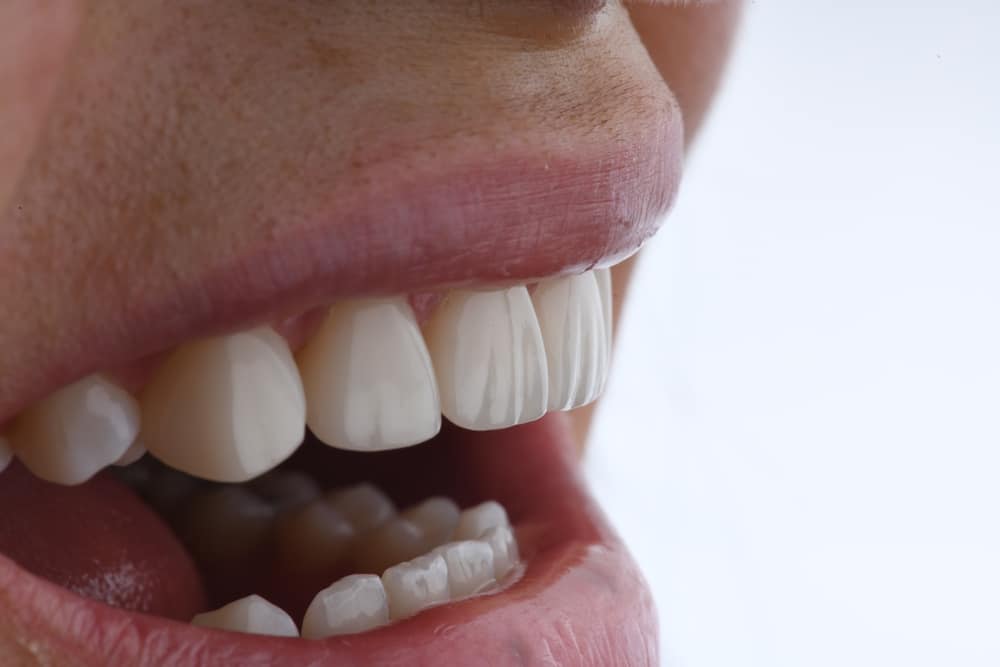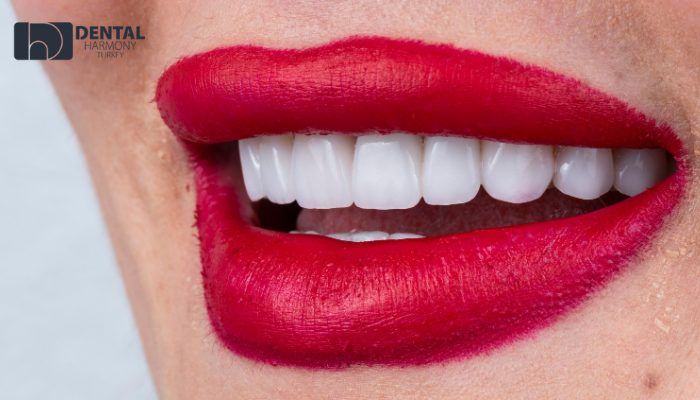What Is Composite Bonding?
Composite bonding is a minimally invasive cosmetic dental treatment that uses a tooth-coloured resin to enhance, repair, or reshape teeth. The material is skillfully applied directly to the enamel, carefully sculpted into the desired shape, then hardened with a special curing light and polished to blend naturally with surrounding teeth.
Unlike ceramic restorations such as EMAX veneers or crowns, bonding typically requires little to no removal of your natural tooth structure. This makes it one of the most conservative—and accessible—ways to improve a smile.
What Problems Can Composite Bonding Fix?
Composite bonding is remarkably versatile. It’s commonly used for:
- Repairing chipped or worn edges
- Closing small gaps between teeth
- Reshaping uneven or short teeth
- Covering discolouration and stubborn stains
- Refining minor misalignments
Because bonding can often be completed in just one appointment, it appeals to patients seeking immediate improvements without lengthy treatment plans.
How Is Composite Bonding Performed?
The procedure is usually straightforward and comfortable:
- Assessment and Shade Selection
Your dentist will first examine your teeth and discuss your goals in detail. Together, you’ll choose a resin shade that matches your natural enamel. - Tooth Preparation
Unlike ceramic veneers, bonding often requires no drilling or anaesthetic. The surface of the tooth is lightly etched to create a slightly rough texture, helping the resin bond securely. - Application and Sculpting
The dentist applies the composite resin in layers, shaping and contouring it carefully to achieve the desired look. - Curing and Polishing
Each layer is hardened with a curing light. Finally, the surface is polished until it feels smooth and looks just like your natural tooth.
The entire process typically takes between 30 and 90 minutes per tooth, depending on complexity.
Advantages of Composite Bonding
Composite bonding offers several appealing benefits:
- Fast Results: Many cases can be completed in a single visit.
- Conservative Treatment: Minimal alteration of natural tooth structure.
- Affordable: Significantly less expensive than ceramic veneers or crowns.
- Reversible: Because enamel removal is minimal, bonding can often be reversed or replaced in the future.
Limitations of Composite Bonding
While bonding is highly effective, it’s important to be aware of its limitations:
- Stain Susceptibility: Composite resin is more porous than ceramics like EMAX and can stain over time, especially if you drink coffee, tea, red wine, or smoke.
- Durability: Bonding is strong but less resistant to wear and chipping than ceramic restorations. The average lifespan is 3–7 years.
- Aesthetic Precision: Although bonding produces attractive results, advanced ceramics such as EMAX tend to have superior translucency and maintain their colour longer.
- Maintenance: Occasional touch-ups or polishing may be needed to keep your teeth looking their best.
How Much Does Composite Bonding Cost in the UK?
The price of composite bonding depends on your location, the dentist’s experience, and the size of the treated area. As of 2025, approximate costs per tooth are:
- Minor edge repair: £150–£250
- Full surface bonding: £250–£400
- Complex reshaping: £400–£600
Compared to EMAX veneers (£700–£1,200 per tooth) or EMAX crowns (£700–£1,200), bonding remains a more budget-friendly option.
Note: Always consult your dentist for a personalised quote based on your specific needs.
Who Is a Good Candidate for Composite Bonding?
Composite bonding works best for patients who:
- Have healthy teeth and gums
- Need minor to moderate cosmetic improvements
- Maintain good oral hygiene
- Understand bonding may require future maintenance or replacement
If you grind or clench your teeth heavily, bonding may not be the ideal choice, as these habits can damage the resin over time. In such cases, EMAX veneers or crowns may be more suitable due to their higher strength.
How Long Does Composite Bonding Last?
With the right care, bonding typically lasts between 3 and 7 years. Some patients enjoy even longer results, depending on:
- The size and location of the bonded area
- Diet and lifestyle habits
- Oral hygiene practices
Regular dental check-ups help monitor bonded teeth for any signs of wear, staining, or chipping, so touch-ups can be done promptly.
How Does Bonding Compare to EMAX Veneers and Crowns?
Here’s a simple comparison to help you decide:
| Feature | Composite Bonding | EMAX Veneers & Crowns |
| Tooth Preparation | Minimal | Moderate enamel reduction |
| Aesthetics | Good | Outstanding, highly lifelike |
| Durability | 3–7 years | 10–15 years or longer |
| Stain Resistance | Moderate | High |
| Cost per Tooth | £150–£600 | £700–£1,200 |
| Reversibility | Usually reversible | Irreversible |
| Treatment Time | 1 appointment | 2–3 appointments |
Maintenance and Aftercare Tips
To keep your bonded teeth looking great:
- Avoid biting hard objects like ice or pens.
- Limit dark-coloured drinks and rinse with water after consuming them.
- Brush twice daily and floss regularly.
- Schedule professional cleanings at least twice a year.
- Consider wearing a night guard if you clench or grind your teeth.
Following these guidelines can help prolong the life and beauty of your bonded smile.
Additional Benefits of Dental Care in Turkey
Many patients explore treatment abroad to save on costs while receiving excellent care. In Turkey, clinics like Dental Harmony Turkey offer:
- Significant savings compared to UK prices
- Highly experienced cosmetic dentists
- Advanced materials such as EMAX ceramics for veneers and crowns
- Short waiting times for appointments
Combining your dental care with a relaxing holiday can make your experience even more rewarding.
Final Thoughts: Is Composite Bonding Worth It?
Composite bonding is an outstanding option for patients who want a fast, affordable, and minimally invasive way to enhance their smile. While it may not offer the same durability or stain resistance as EMAX veneers or crowns, it provides a flexible solution that can be refined over time.
If you’re considering bonding or ceramic restorations, consult with an experienced cosmetic dentist to discuss your goals and understand what results are realistic for you. For many people, bonding offers the perfect balance of aesthetics, affordability, and convenience.
At Dental Harmony Turkey, we combine artistic skill with advanced materials like EMAX to design natural-looking results you’ll love. Contact us today to schedule a consultation and discover which option is right for your smile.
Dental Veneers UK: Dramatic Smile Makeovers with EMAX Veneers
Zirconia vs EMAX Crowns UK: Which Crown Material Lasts Longer?



